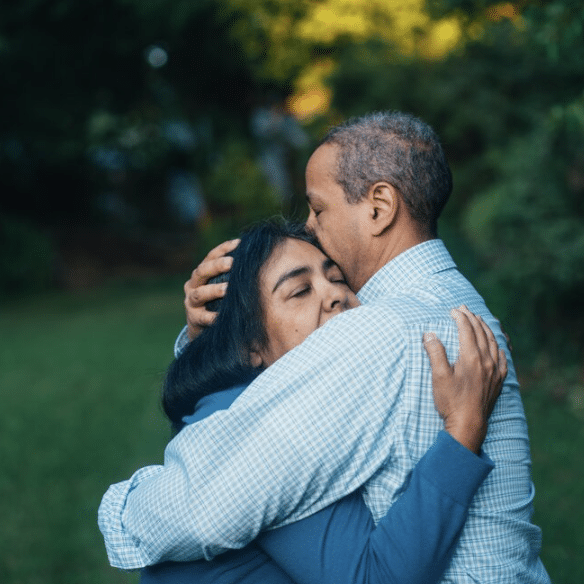How to Reconnect With Your Partner When Communication Is Difficult
by Vanessa H. Roddenberry, Ph.D., HSP-P
When you’ve been with a partner for years, maybe even decades, communication breakdowns can become more than just a minor issue—they can turn into deep chasms of frustration and misunderstanding. It’s especially painful when every attempt to express yourself is met with defensiveness or resistance, and any effort to discuss emotions or unmet needs is seen as conflict. When you try to talk about anything more than surface level issues, they emotionally shut down. This can leave you feeling alone and questioning your experience.
For many individuals in long-term relationships, avoiding conflict becomes the default mode. But the emotional toll of not being able to communicate your needs, or constantly tiptoeing around your partner’s reactions, can erode the relationship over time. You’re not alone if you find yourself feeling emotionally disconnected and exhausted from trying to have a simple conversation without it becoming a battle.
Understanding the Impact of Conflict Avoidance
Many people—especially those with trauma, insecurity, or low self-esteem—may interpret any emotional conversation as conflict. For partners like this, defensiveness is a way to protect themselves from feelings of inadequacy or fear of criticism. Unfortunately, this can make even basic communication feel impossible, leaving you feeling unheard and invalidated.
When these patterns persist, you may feel emotionally distant, frustrated, or even resentful. This can lead to a vicious cycle: the more you try to communicate, the more your partner retreats or reacts, and the more disconnection builds in the relationship.
Why Communication is Treated Like Conflict
Conflict avoidance often stems from underlying emotional pain. Here are some common reasons your partner might treat communication as conflict:
- Defensiveness: They feel criticized or attacked, even if the conversation is intended to be open and honest. They can react to this by shutting down and avoiding talking or deflecting.
- Fear of Vulnerability: Opening up emotionally may feel too risky or uncomfortable, so shutting down seems like the safer choice.
- Negative Past Experiences: If previous conversations have turned into fights, your partner may avoid discussion to prevent a repeat of those painful experiences.
- Insecurity or Low Self-Esteem: Feeling inadequate or unworthy of love might make them resist any feedback or emotional discussion, viewing it as confirmation of their fears.
While these are understandable emotional reactions, they can leave the other partner (you) feeling silenced and emotionally abandoned.
Tools and Techniques for Navigating Communication Roadblocks
The good news is, even if you’re in a relationship where communication is seen as conflict, there are strategies you can use to break this cycle. It’s important to acknowledge that it takes both partners’ willingness to work on these issues, but there are tools you can try to create a safer space for communication:
1. Start with a Soft Approach
Instead of jumping straight into the difficult conversation, start by setting a gentle tone. You might say:
- “I’ve been feeling disconnected lately, and I want to talk about how we can feel closer. I’m not blaming you, I just want to work together on this.”
This lowers defenses and emphasizes that your goal is connection, not conflict.
2. Focus on “I” Statements
Using “I” statements helps shift the conversation away from blame and towards expressing your own feelings. For example:
- “I feel really hurt when we can’t talk about how I’m feeling without it becoming tense. I need us to find a way to communicate more easily.”
This type of statement makes it clear that you’re discussing your feelings, not attacking their behavior.
3. Active Listening and Validation
Partners who react defensively often feel unheard. Before diving into your own needs, try validating theirs first:
- “I know this is a hard conversation for you, and I want you to know I hear you. But I need us to talk about this because it’s important for me too.”
Validating their experience can help lower emotional walls and make them more open to hearing your perspective.
4. Nonviolent Communication (NVC)
Developed by Marshall Rosenberg, Nonviolent Communication is a technique that emphasizes connection over confrontation. It involves four key steps:
- Observation: State what you’ve observed without judgment.
- Feelings: Express how you feel.
- Needs: Identify the unmet need driving those feelings.
- Request: Make a specific request for what you need moving forward.
For example:
- “When we argue, I feel really lonely because I need to feel emotionally connected to you. Can we find a way to talk about things calmly, without getting defensive?”
5. Pick the Right Time
Sometimes, the timing of a conversation can make all the difference. Avoid trying to talk when emotions are already running high, or when your partner is tired or distracted. Suggest setting aside time when you’re both in a more neutral or positive emotional space.
6. Therapy and Support
While finances may make couples therapy inaccessible, there are many free or low-cost resources for emotional support. Support groups or online communities can be valuable spaces to share your struggles and get advice from those who’ve been through similar experiences. Even if your partner resists therapy, individual counseling for yourself can help you navigate the emotional complexities of your relationship.
Breaking the Cycle of Avoidance
Building healthier communication in a relationship where conflict avoidance is common takes time and patience. You may not see immediate changes, but with consistent effort and empathy, it’s possible to create a safer, more open environment for both partners.
Call to Action
If you’re struggling to communicate without it turning into conflict, know that you don’t have to navigate this alone. Seeking support from a therapist, counselor, or support group can help you develop the tools you need to reconnect emotionally with your partner.
At Breyta, we specialize in couples therapy and helping individuals develop effective communication skills. Whether you’re looking for relationship support or personal emotional healing, we’re here to help. You can address this issue in individual therapy for relationship issues, or in couples therapy with your partner. Reach out today for a consultation and take the first step toward creating the emotional connection you deserve.





